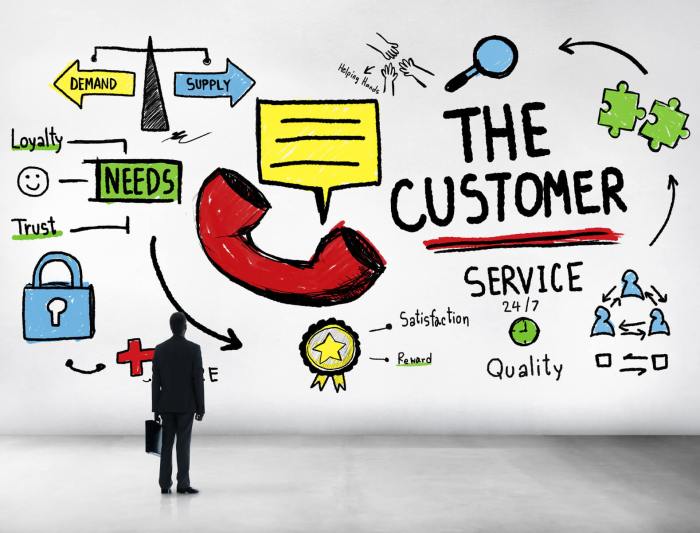Kicking off with Customer Service Excellence, this topic dives into the importance of exceptional customer service in boosting a company’s reputation and profitability. From key strategies to measuring success, let’s explore the ins and outs of delivering top-notch customer service.
The Importance of Customer Service Excellence
Customer service excellence is crucial for businesses as it directly impacts the overall reputation and profitability of a company. Providing exceptional customer service can set a business apart from its competitors, leading to increased customer satisfaction, loyalty, and retention.
Enhanced Company Reputation
- Positive customer service experiences can result in word-of-mouth referrals and positive online reviews, enhancing the company’s reputation.
- Companies known for excellent customer service are more likely to attract new customers and retain existing ones.
- On the other hand, poor customer service can lead to negative feedback, damaging the company’s image and credibility.
Impact on Profitability
- Customers are willing to pay more for products or services from companies that provide exceptional customer service.
- Repeat customers who are satisfied with the service are more likely to make additional purchases and become loyal patrons.
- Reduced customer churn and increased customer lifetime value contribute to the overall profitability of the business.
Enhanced Customer Loyalty and Retention
- By delivering outstanding customer service, businesses can build strong relationships with their customers, fostering loyalty and trust.
- Loyal customers are more likely to continue doing business with the company and recommend it to others, leading to sustainable growth.
- Providing personalized and attentive service can create emotional connections with customers, making them feel valued and appreciated.
Strategies for Achieving Customer Service Excellence
To achieve customer service excellence, businesses can implement key strategies that focus on meeting and exceeding customer expectations. One crucial aspect is training employees to deliver exceptional customer service consistently. This ensures that every interaction with customers is positive and leaves a lasting impression.
Importance of Training Employees
Training employees in delivering excellent customer service is essential for ensuring a consistent and high-quality experience for customers. By providing comprehensive training programs, businesses can equip their employees with the necessary skills and knowledge to handle various customer interactions effectively. This includes communication skills, problem-solving techniques, and the ability to empathize with customers’ needs and concerns.
- Training helps employees understand the importance of customer satisfaction and the role they play in achieving it.
- It empowers employees to handle challenging situations with professionalism and confidence.
- Continuous training and development enable employees to stay updated on best practices and industry trends in customer service.
Role of Technology in Enhancing Customer Service Experiences
Technology plays a vital role in enhancing customer service experiences by providing efficient and personalized solutions to customers. Businesses can leverage technology to streamline customer interactions, gather feedback, and improve overall service delivery.
- Implementing customer relationship management (CRM) systems helps businesses track customer interactions and preferences, allowing for more personalized service.
- Utilizing chatbots and AI-powered tools can provide instant support to customers, addressing their queries in real-time.
- Online self-service portals and mobile apps offer customers convenience and control over their interactions, leading to higher satisfaction levels.
Key Elements of Customer Service Excellence

Customer service excellence is achieved by incorporating various key elements that are essential for satisfying customers and building strong relationships. Active listening, empathy, and problem-solving skills play a crucial role in providing exceptional customer service.
Active Listening
Active listening is a fundamental element of customer service excellence. It involves fully concentrating on what the customer is saying, understanding their needs, and providing appropriate responses. By actively listening to customers, service providers can demonstrate respect, show empathy, and address issues effectively. This leads to increased customer satisfaction and loyalty.
Empathy
Empathy is another vital element in achieving customer service excellence. It involves understanding and sharing the feelings of customers, putting oneself in their shoes, and acknowledging their emotions. By showing empathy towards customers, service providers can create a positive experience, build trust, and establish a strong rapport. Empathy helps in forming meaningful connections with customers and resolving issues with care and compassion.
Problem-Solving Skills
Effective problem-solving skills are essential for delivering excellent customer service. Service providers must be able to identify issues, analyze situations, and find solutions promptly. By demonstrating strong problem-solving skills, service providers can address customer concerns efficiently, resolve conflicts, and ensure customer satisfaction. Problem-solving skills are crucial for handling challenging situations, turning negative experiences into positive ones, and maintaining a high level of service excellence.
Measuring Customer Service Excellence

Measuring customer service excellence is crucial for businesses to understand how well they are meeting customer needs and expectations. By evaluating different metrics and feedback mechanisms, companies can identify areas for improvement and ensure they are delivering top-notch service.
Different Metrics and Methods, Customer Service Excellence
There are various metrics and methods used to measure customer service excellence, including:
- Net Promoter Score (NPS): This metric measures customer loyalty and satisfaction by asking customers how likely they are to recommend the company to others.
- Customer Satisfaction Score (CSAT): CSAT surveys are used to gauge how satisfied customers are with a particular interaction or experience.
- First Contact Resolution (FCR): FCR measures the percentage of customer issues resolved in a single interaction, reflecting the efficiency of customer service.
Customer Feedback Mechanisms
Customer feedback mechanisms play a crucial role in evaluating customer service performance. Examples of feedback mechanisms include:
- Customer Surveys: Surveys can be conducted after customer interactions to gather feedback on the service experience.
- Online Reviews: Monitoring online reviews on platforms like Yelp or Google can provide insights into customer satisfaction levels.
- Customer Complaint Logs: Keeping track of customer complaints and resolutions can help identify recurring issues and areas for improvement.
Importance of Continuous Improvement
Continuous improvement is essential in maintaining customer service excellence as customer expectations evolve over time. By consistently analyzing feedback and metrics, businesses can adapt their service strategies to meet changing customer needs and preferences.





